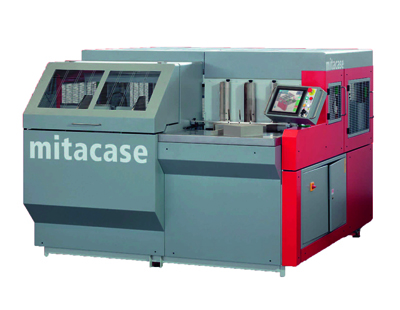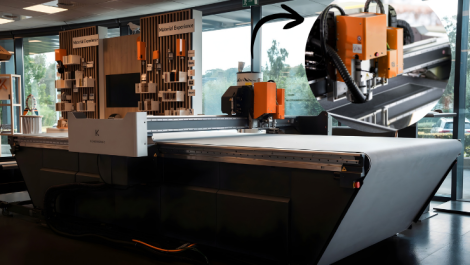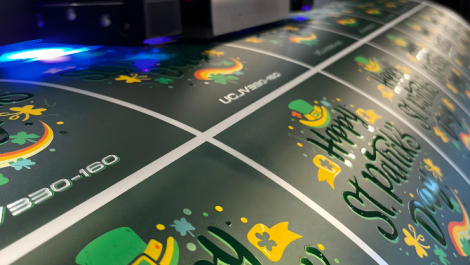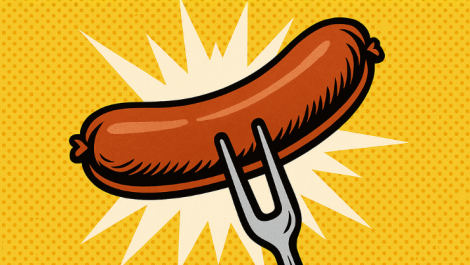The automatic Mitacase is intended to bridge the gap between low end semi-auto and high priced, high volume case systems.
Simon Eccles looks at the increasing choice of case binding systems at all levels, designed to complement digital book production.
Making hard cover cases is much more complex than soft covers. They have to be assembled from multiple pieces, glued, edge-folded and pressed. After assembly the case has to be attached to the book block (casing-in), often with more pressing and hinge-forming.
This complexity is why case making systems originally lagged behind soft covers for digital books. Digitally printed books typically involve short runs, for which semi-manual or low-to-medium speed automatic case systems may fit the bill. However, large books-on-demand operations need high volume, fully automatic case lines that adjust to single copies or small batches on the run.
At the simplest level you can buy ready-made cases such as the Unibind XE range sold by Murodigital, which use Steelback spines with hot melt adhesive pre-applied. You put trimmed sections inside a cover, place it in the heated activator, and in a few minutes it is ready. Some versions let you create your own cases.
Unibind’s full range includes commercial high volume models, with the £50,000 BCC10 making up to 400 books per hour. It also offers the £195,000 Casemaker 750A, also running at 400 per hour, which wraps digitally printed cover papers around pre-assembled Caseplano board sets.
Duplo sells the short run Powis Fastback range. These use hotmelt glued spine strips to bind cut sheets. A pro-level Fastback 20 heat binding unit costs £3200. For case binding you will need the £204 Hard Cover Guide, a simple table with adjustable guides for assembling cases with peel-off adhesive sheets.
Ashgate Automation has done a lot to popularise photobook finishing with the Fastbind range made by Maping in Finland. Its Casematic custom casemaking table range uses peel-off self-adhesive cover sheets with standard grey boards. There is now Fastbind Case Express, a ready-made range of printable covers and boards to make the likes of ring binders and CD cases.
US company On Demand Machinery has developed an innovative range of short run semi-auto and full automatic book binding machines. These are distributed in the UK by Perfect Bindery Solutions. ODM’s standard semi-auto Casemaking System is a steel bench with a range of guides and powered components for cutting, gluing, pressing and edge-folding cases up to 457 x 762 mm (open) size. The larger XXL model allows a huge 578 x 1187 mm. There are corresponding casing-in machines: the manually loaded Sticker and belt-loaded Super Sticker, plus the larger manual load Sticker XXL.
Perfect Bindery Solutions also distributes the fully automatic Hörauf casing-in machines from Germany. Its latest BDM Compact model is intended for short runs, running at 45 to 60 books per minute with sizes up to 390 x 660 mm. It uses hotmelt glue.
Duplo sells the Mita range from Switzerland. Most prominent are the Mitamax models for assembling layflat book blocks, but there is a pair of automated case machines too: the £252,672 Mitacase for automatic assembly of up to eight cases per minute (using hotmelt animal glue), and Mitabook is a £229,152 casing-in machine that makes up to seven books per minute with one-person operation.
Horizon, distributed by IFS in the UK, has two generations of case systems on offer. It first generation, still on sale, is the HCM-1 casemaker for pre-glued boards, running at up to 40 cases per hour; and the compact HCP-1 casing-in machine for up to 50 books per hour.
The second generation HCB-2 is a single machine combining casemaking and casing-in, using self-adhesive sheets with standard grey boards. This can make up to 180 books per hour with covers up to 340.8 x 680.6 mm and thicknesses up to 25 mm.
Kolbus and Müller Martini occupy the top end of this market. Müller Martini’s Diamant MC 35 is a casing-in line (with joint-forming and pressing) for up to 2,100 cycles per hour. The faster MC 60 handles up to 3600 cycles. They run batches of similar sizes but where the thickness can vary within preset bounds (the total range is 2 to 80 mm). As one batch is completed the machine adjusts itself in sequence to the next size, without stopping.
Kolbus is the company that worked with Digital Printer to produce a fully personalised hard cover edition of the magazine in March 2011. Notable big installations include the high volume photo book/short run book line at Harrier in Newton Abbott and on-demand book lines at CPI Antony Rowe.
Its DA260 is an ‘entry level’ case maker for up to 40 covers per minute, while the A270 offers slightly more automated makeready and can hit 65 per minute. There is a 100-books-per-minute version too. Casing-in and pressing can be handled by the Bookjet edition of the BF 530 book finishing line. This can takes batches of similar size while adjusting to different individual thicknesses at the full speed of 70 cycles per minute.





